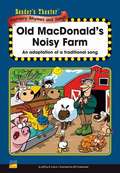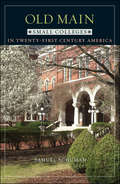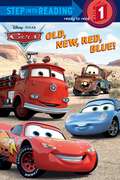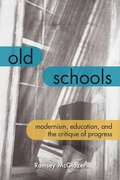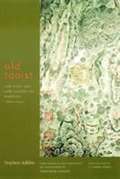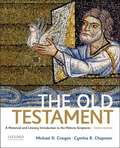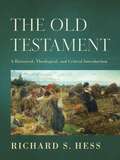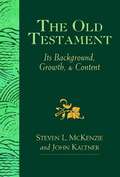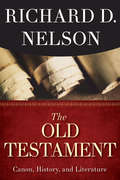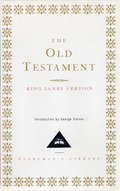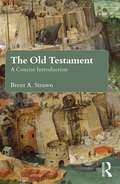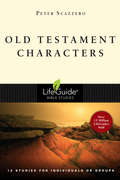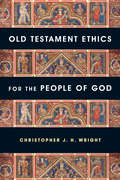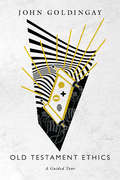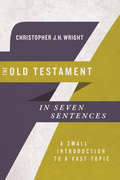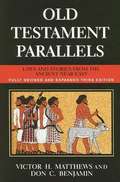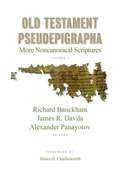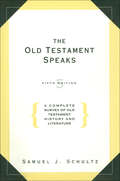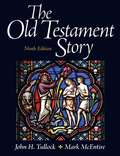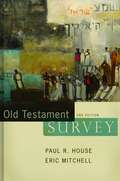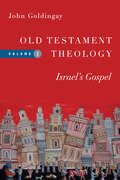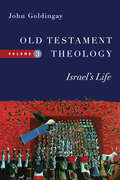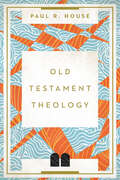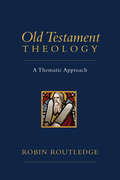- Table View
- List View
Old MacDonald's Noisy Farm: An Adaptation of a Traditional Song
by Jeffrey B. Fuerst6 copies of Script plus Teacher's Guide
Old Main: Small Colleges in Twenty-First Century America
by Samuel SchumanThis perceptive and cogent account draws on key data and firsthand observations to tell the story of the small college in America. Defined as institutions that enroll between 500 and 3,000 full-time students, small colleges number about six hundred in the United States. Many are thriving, while some—whether through low enrollment, ballooning debt, or simple misfortune—face uncertain futures. Informed by his own experiences as a teacher and administrator, Samuel Schuman sketches the history and development of these institutions; then focuses on their current conditions and future possibilities. Administrators, faculty, and researchers will appreciate Schuman's insight into institutional choices and their consequences. Old Main is an essential book for anyone who shares Schuman's conviction that small colleges occupy a central place in American higher education.
Old, New, Red, Blue! (Step into Reading)
by RH DisneyLightning McQueen from Disney/Pixar Cars cleans up the town in this Step 1 Step Into Reading reader! Ready, set, GO! Lightning McQueen, the rookie hot-shot race car, is screaming his way down the track on his way to winning the Piston Cup. But when he gets stuck in a slow little town called Radiator Springs, McQueen must learn a valuable lesson about friendship-fast. This beautifully illustrated Read-Aloud Storybook is the complete retelling of Disney/Pixar's Cars.
Old Schools: Modernism, Education, and the Critique of Progress (Lit Z)
by Ramsey McGlazerOld Schools marks out a modernist countertradition. The book makes sense of an apparent anachronism in twentieth-century literature and cinema: a fascination with outmoded, paradigmatically pre-modern educational forms that persists long after they are displaced in progressive pedagogical theories.Advocates of progressive education turned against Latin in particular. The dead language—taught through time-tested means including memorization, recitation, copying out, and other forms of repetition and recall—needed to be updated or eliminated, reformers argued, so that students could breathe free and become modern, achieving a break with convention and constraint. Yet McGlazer’s remarkable book reminds us that progressive education was championed not only by political progressives, but also by Fascists in Italy, where it was an object of Gramsci’s critique. Building on Gramsci’s pages on the Latin class, McGlazer shows how figures in various cultural vanguards, from Victorian Britain to 1970s Brazil, returned to and reimagined the old school.Strikingly, the works that McGlazer considers valorize this school’s outmoded techniques even at their most cumbersome and conventional. Like the Latin class to which they return, these works produce constraints that feel limiting but that, by virtue of that limitation, invite valuable resistance. As they turn grammar drills into verse and repetitious lectures into voiceovers, they find unlikely resources for critique in the very practices that progressive reformers sought to clear away.Registering the past’s persistence even while they respond to the mounting pressures of modernization, writers and filmmakers from Pater to Joyce to Pasolini retain what might look like retrograde attachments—to tradition, transmission, scholastic rites, and repetitive forms. But the counter-progressive pedagogies that they devise repeat the past to increasingly radical effect. Old Schools teaches us that this kind of repetition can enable the change that it might seem to impede.
Old Taoist: The Life, Art, And Poetry Of Kodôjin (1865-1944)
by Stephen Addiss Jonathan Chaves J. Thomas RimerIn the literary and artistic milieu of early modern Japan the Chinese and Japanese arts flourished side by side. Kodojin, the "Old Taoist" (1865-1944), was the last of these great poet-painters in Japan. Under the support of various patrons, he composed a number of Taoist-influenced Chinese and Japanese poems and did lively and delightful ink paintings, continuing the tradition of the poet-sage who devotes himself to study of the ancients, lives quietly and modestly, and creates art primarily for himself and his friends. Portraying this last representative of a tradition of gentle and refined artistry in the midst of a society that valued economic growth and national achievement above all, this beautifully illustrated book brings together 150 of Kodojin's Chinese poems (introduced and translated by Jonathan Chaves), more than 100 of his haiku and tanka (introduced and translated by Stephen Addiss), and many examples of his calligraphy and ink paintings. Addiss's in-depth introduction details the importance of the poet-painter tradition, outlines the life of Kodojin, and offers a critical appraisal of his work, while J. Thomas Rimer's essay puts the literary work of the Old Taoist in context.
The Old Testament: A Historical And Literary Introduction To The Hebrew Scriptures
by Michael D. Coogan Cynthia R. ChapmanLucidly written by leading biblical scholars Michael D. Coogan and Cynthia R. Chapman, this balanced, engaging, and up to date introduction to the Hebrew scriptures distills the best of current scholarship. Employing the narrative chronology of the Bible itself and the history of the ancient Near East as a framework, Coogan and Chapman cover all the books of the Hebrew Bible, along with the deuterocanonical books included in the Bible used by many Christians. They work from a primarily historical and critical methodology but also introduce students to literary analysis and other interpretive strategies.
The Old Testament: A Historical, Theological, and Critical Introduction
by Richard S. HessRichard Hess, a trusted scholar of the Old Testament and the ancient Near East, offers a substantial introduction to the Old Testament that is accessibly written and informed by the latest biblical scholarship. Hess summarizes the contents of the Old Testament, introduces the academic study of the discipline, and helps readers understand the complex world of critical and interpretive issues, addressing major concerns in the critical interpretation of each Old Testament book and key texts. <p><p>This volume provides a fulsome treatment for students preparing for ministry and assumes no prior knowledge of the Old Testament. Readers will learn how each book of the Old Testament was understood by its first readers, how it advances the larger message of the whole Bible, and what its message contributes to Christian belief and the Christian community. Twenty maps, ninety photos, sidebars, and recommendations for further study add to the book's usefulness for students.
The Old Testament
by John Kaltner Steven L. MckenzieIn a straightforward and understandable style, without distortion or oversimplification, Steven L. McKenzie and John Kaltner introduce readers to the content of the Old Testament and to critical methods developed to read it. Utilizing the finest modern scholarship, the authors detail the role of editors in shaping the Old Testament, examine the historical and literary contexts in which it grew, and discuss important interpretive issues in each book. Each chapter introduces the biblical book at hand through the lenses of content, growth, context, and interpretation, and the text moves through the Bible in the order of the Jewish canonical units, Torah, Former Prophets, Latter Prophets, and Writings.
The Old Testament: Canon, History, and Literature (The\old Testament Library)
by Richard D. NelsonEngaging and accessible to students from all backgrounds, this book is a comprehensive introduction to the Old Testament. It is designed to equip readers with the knowledge and skills needed to read, interpret, and benefit from the Old Testament/Hebrew Bible in their own context. Using scholarly consensus and current research with numerous examples, this book helps prepare students for further advanced courses related to exegesis, individual books, and special topics. It also provides a balanced approach to controversial areas in biblical scholarship such as violence, sexuality, and slavery. More importantly, this introduction understands the Old Testament as a resource for the human quest for meaning making it an essential tool for helping students appropriate this, often neglected, part of the Bible for their own faithful living. It includes at-a-glance sections to highlight matters of special interest- including material about important ancient Egyptian west Asian documents; significant archaeological excavations; a demonstration of textual criticism; problematic translation issues such as Gen 1:1, Isa 7:14, or Job 19:25; special problems such as the chronology of the kings and the dating of the second fall of Jerusalem.
The Old Testament
by George Steiner Everyman'S LibraryIn his introduction to the Everyman's Library edition of the Old Testament in the King James Version, George Steiner reminds us of the literary grandeur, uniqueness, and centrality of the Bible. "What you have in hand is not a book. It is the book. That, of course, is what 'Bible' means. It is the book which, not only in Western humanity, defines the concept of a text. All our other books, however different in matter or method, relate, be it indirectly, to this book of books... "All other books, be they histories, narrations of the imaginary, codes of law, moral treatises, lyric poems, dramatic dialogues, theological-philosophic meditations, are like sparks, often, to be sure, distant, tossed by an incessant breath from a central fire. In the Western condition, but also in other parts of the planet to which the 'Good Book' has been taken, the Bible largely informs our historical and social identity... "No other book is like it; all other books are inhabited by the murmer of that distant source." Steiner underlines, as well, our great good fortune in being able to read the Bible--which has been translated in whole or in part into more than two thousand languages--in the resplendent language of seventeenth-century England. "This is the instrument of Spenser, of Shakespeare, of Bacon, of Donne and the young Milton. It encompasses the organblasts of the Queen's rhetoric, Sidney's intimacies of desire, the 'lapidary lightness' of Ben Jonson, and the compaction of the early Metaphysical poets. It can command, seduce, enchant, and think aloud as never before or since...There could not have been a moment, a climate of feeling and general discourse, more apt to engender the two foremost constructs in the language: Shakespeare and the King James Version."(Book Jacket Status: Jacketed)
The Old Testament: A Concise Introduction
by Brent A. StrawnThis concise volume introduces readers to the three main sections of the Hebrew Bible (Tanakh) and to the biblical books found in each. It is organized around two primary "stories": the story that scholars tell about the Old Testament and the story the literature itself tells. Concluding with a reconsideration of the Old Testament as more like poetry than a story, three main chapters cover: The Pentateuch (Torah) The Prophets (Neviʾim) The Writings (Ketuvim) With key summaries of what the parts of the Old Testament "are all about," and including suggestions for further reading, this volume is an ideal introduction for students of and newcomers to the Old Testament.
Old Testament Characters (LifeGuide Bible Studies)
by Peter ScazzeroAbraham is an unforgettable figure of faith. Daniel is a classic example of holiness. And through her willingness to risk her own life, Esther shows us what commitment means. This twelve-session LifeGuide Bible Study introduces you to twelve remarkable lives described in the Old Testament. The stories of these people from the ancient past can help you learn to live well even today. This LifeGuide Bible Study in IVP Connect's revised format features questions for starting group discussions and for meeting God in personal reflection, as well as a "Now or Later" section following each session to help you act on what you learn. PDF download with a single-user license; available from InterVarsity Press and other resellers. For over three decades LifeGuide Bible Studies have provided solid biblical content and raised thought-provoking questions���making for a one-of-a-kind Bible study experience for individuals and groups. This series has more than 130 titles on Old and New Testament books, character studies, and topical studies.
Old Testament Ethics for the People of God
by Christopher J. H. WrightNothing confuses Christian ethics quite like the Old Testament. Some faithful readers struggle through its pages and conclude that they must obey its moral laws but may disregard its ceremonial and civil laws. Others abandon its teaching altogether in favor of a strictly New Testament ethic. Neither option, argues Chris Wright, gives the Old Testament its due. In this innovative approach to Old Testament ethics--fully revised, updated and expanded since its first appearance in 1983 as Living as the People of God (An Eye for an Eye in North America) and including material from Walking in the Ways of the Lord--Wright examines a theological, social and economic framework for Old Testament ethics. Then he explores a variety of themes in relation to contemporary issues: economics, the land and the poor; politics and a world of nations; law and justice; society and culture; and the way of the individual. This fresh, illuminating study provides a clear basis for a biblical ethic that is faithful to the God of both Testaments.
Old Testament Ethics: A Guided Tour
by John GoldingayWhat is ethics? Ethics is not merely about tricky situations or hot topics. Instead, ethics asks questions about what sort of people we are, how we think, what sort of things we do and don't do, and how we ought to live our everyday lives. How might we learn ethics from the Old Testament? Instead of searching for support for our positions or pointing out problems with certain passages, trusted guide John Goldingay urges us to let the Old Testament itself set the agenda. In this volume, readers will encounter what the Old Testament teaches about relationships, work, Sabbath, character, and more. Featuring Goldingay's own translation and discussion questions for group use, Old Testament Ethics: A Guided Tour is a resource for ethics like no other. Topically organized with short, stand-alone chapters, this book is one to keep close at hand.
The Old Testament in Seven Sentences: A Small Introduction to a Vast Topic (Introductions in Seven Sentences)
by Christopher J. H. WrightSome people find the Old Testament to be confusing, out of date, and essentially replaced by the New Testament. They are missing out. The Old Testament offers us a grand narrative that reveals God's work, God's purposes, and God's wisdom. Christopher J. H. Wright fits the pieces together and shows us the coherent whole. Using seven key sentences drawn straight from the Old Testament, he connects the dots and points us toward Jesus. "In the beginning God created the heavens and the earth." "All peoples on earth will be blessed through you." "You shall have no other gods before me." "How beautiful on the mountains are the feet of him who brings good news." Such sentences as these are not merely beautiful or helpful (though they are that). They are part of the great drama of Scripture, the story of God's plan of redemption that embraces all nations and the whole of his creation. Wright starts from the beginning, describing God's promises and covenants with his people and his mission to bless the world. At the end of this short survey, readers will clearly see God's faithfulness and love for his people and will understand how the Old Testament scriptures prepared for the identity and mission of Jesus as Messiah, Savior, and Lord.
Old Testament Parallels: Laws And Stories From The Ancient Near East, 3rd ed.
by Victor H. Matthews Don C. BenjaminA readable, portable anthology of ancient Near Eastern laws and stories that share parallel themes and issues with biblical stories. This third edition has been completely revised in light of the ongoing discoveries of more and more ancient Near Eastern texts and many of the parallels from the first two editions have been added.
Old Testament Pseudepigrapha: More Noncanonical Scriptures
by Richard Bauckham James R. Davila Alex PanayotovThis work stands among the most important publications in biblical studies over the past twenty-five years. Richard Bauckham, James Davila, and Alexander Panayotov’s new two-volume collection of Old Testament pseudepigrapha contains many previously unpublished and newly translated texts, complementing James Charlesworth’s Old Testament Pseudepigrapha and other earlier collections.Including virtually all known surviving pseudepigrapha written before the rise of Islam, this volume, among other things, presents the sacred legends and spiritual reflections of numerous long-dead authors whose works were lost, neglected, or suppressed for many centuries. Excellent English translations along with authoritative yet accessible introductions bring those ancient documents to life for readers today.
The Old Testament Speaks: A Complete Survey of Old Testament History and Literature
by Samuel J. SchultzHere is a freshly updated edition of one of the most popular introductions to the history and literature of the Old Testament. The Old Testament Speaks offers a clear picture of the archaeological, geographical, historical, and linguistic dimensions of God's covenant with his people from the time of Abraham to the coming of the Messiah. The Old Testament Speaks examines the historical and religious life of the Hebrews, integrates the development of non-hebraic cultures with conventional biblical history, and reviews the best modern scholarly research in placing the Scriptures in their Near Eastern setting.Samuel J. Schultz emphasizes the importance of letting the Scriptures tell their own stories. He makes selective use of the best and latest literature in Old Testament studies, and offers a balanced perspective. Schultz sifts the facts and follows them to their inevitable conclusions. However, when the evidence is not definitive, he exercises caution, presenting his own interpretation as only one of several possible views. Schultz also appraises the impact of recent archaeological and historical findings on the understanding of key portions of the Old Testament.The Old Testament Speaks contains all the relevant material -- biblical and nonbiblical -- necessary for classroom use or personal study of the Old Testament. Schultz provides outlines that reflect the historical background and summarize the contents of each biblical book, as well as charts and maps to help visualize the biblical narrative. He has also revised and updated the biblio-graphies at the end of each chapter.
The Old Testament Story (Ninth Edition)
by John Tullock Mark McentireExploring the Literary Structure of the Old Testament. The Old Testament Story is designed for readers with little or no knowledge of the Old Testament. It provides complete background detail as it follows the story told by the Old Testament/Hebrew Bible. In addition, it examines the separate biblical books and illustrates their literary structure.
Old Testament Survey
by Paul R. House Eric A. MitchellThis second edition of the widely used and highly praised Old Testament Survey revises the original edition and greatly expands its attention to historical and geographical topics. These are combined with the first edition’s focus on literature and narrative, and an increased amount of improved maps are also included. In all, the book charts every major element that unifies the Old Testament, making it an excellent companion for Bible reading. Any student desiring a thorough and time-tested overview of the Bible’s first half will find it in this updated edition of Old Testament Survey.
Old Testament Survey (Part 2: Job--Malachi)
by Gary B. SmithThis is the second book in a series of three Bible study books. Clearly written. Thought-provoking, as well as review questions.
Old Testament Theology: Israel's Gospel (Old Testament Theology Series #Volume 1)
by John GoldingayECPA Gold Medallion Award winnerIn this first volume of a three-volume Old Testament theology, John Goldingay focuses on narrative. Examining the biblical order of God's creation of and interactions with the world and Israel, he tells the story of Israel's gospel as a series of divine acts:God BeganGod Started OverGod PromisedGod DeliveredGod SealedGod GaveGod AccommodatedGod WrestledGod PreservedGod SentGod ExaltedThis is an Old Testament theology like no other. Whether applying magnifying or wide-angle lenses, Goldingay is closely attentive to the First Testament's narrative, plot, motifs, tensions and subtleties. Brimming with insight and energy, and postmodern in its ethos, this book will repeatedly reward readers with fresh and challenging perspectives on God and God's ways with Israel and the world—as well as Israel's ways with God.Old Testament TheologyVolume two focuses on Israel's faith, or Old Testament theology as belief. It explores the person and nature of God, the nature of the world and humanity, the character of sin and the significance of Israel. Volume three's focus is Israel's life, or Old Testament theology as ethos, exploring its worship, spirituality, ideals and vision for living.
Old Testament Theology: Israel's Life (Old Testament Theology Series #Volume 3)
by John GoldingayIn this third volume of his critically acclaimed Old Testament Theology John Goldingay explores the Old Testament vision of Israel's life before God. The first volume focused on the story of God's dealings with Israel, or Israel's gospel. The second volume investigated the beliefs of Israel, or Israel's faith. Now the spotlight falls on the Old Testament's perspective on the life that Israel should live in its present and future, including its worship, prayer and spirituality, as well as its practices, attitudes and ethics before God. Goldingay sees three spheres of life giving order to Israel's vision: its life in relation to God, its life in community and the life of the individual as a self. Within these frameworks he unfurls a tapestry that is as broad and colorful as all of life, and yet detailed in its intricate attention to the text. With this final volume John Goldingay has given us the third pillar of an Old Testament theology that is monumental in scope and yet invites us to enter through multiple doors to explore its riches. Students will profit from a semester in its courts, and ministers of the Word will find their preaching and teaching deeply enriched by wandering its halls and meditating in its chambers.
Old Testament Theology: Twenty Centuries Of Unity And Diversity
by Paul R. HouseThe discipline of Old Testament theology continues to be in flux as diverse approaches vie for dominance. Paul House serves as our guide—without being partisan or uninformed—exploring each Old Testament book, summarizing its content and showing its theological significance within the whole of the Old Testament canon. Readers with little prior background will find House’s thematic surveys particularly helpful for coming to grips with basic biblical content as well as for probing the theological nuances of individual parts of the canon. The book concludes by forging a set of summary statements concerning God and his character, the people of God, and links between the Old and New Testaments that suggest avenues for the exploration of a full biblical theology. Old Testament Theology offers an overview of the discipline and a fair treatment of differing views while remaining unabashedly evangelical. Readers will welcome the obvious passion of its author for the subject matter. Student friendly and useful to a wide audience, this impressive work has proved a profitable read for many.
